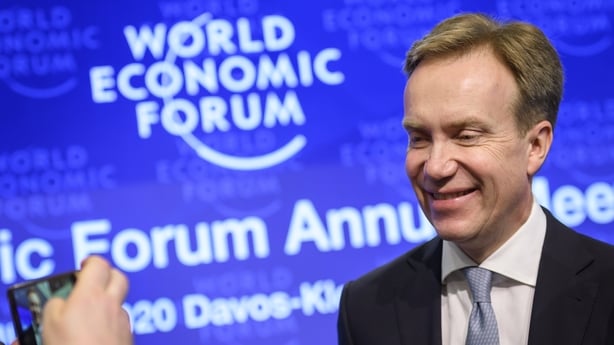The head of the World Economic Forum (WEF) has said the era of increased post-Cold War cooperation between countries on a range of global challenges has "definitely ended", ahead of the annual gathering in Davos.
In a downbeat assessment of the state of the world, WEF President and CEO Børge Brende said: "The three decades of increased cooperation that we saw after the Cold War has definitely ended. We are between world orders.
"We had one world order post the Cold War that enhanced and incentivised cooperation. And no, we don't really know what the new world order is about, but cooperation also has to play a role."
The body, which brings together political and industry leaders, as well as influencers and global charities, produces an annual "barometer" of cooperation, using 41 indicators across a number of themes, which include the global economic outlook as well as peace and security.
The report, produced in conjunction with McKinsey, the management consultancy, said that global cooperation was at "a critical juncture".
It stated: "After trending positively for a decade and surpassing pre-pandemic levels, overall cooperation has stagnated."
The slump in cooperation was a result of growing geopolitical tensions and sharper competition between rival countries and blocs.
"Levels of conflict and attendant humanitarian crises have increased in the past year to record levels, driven by crises including, but not limited to, the Middle East, Ukraine and Sudan," the report stated.
During a video-call to launch the report, Mr Brende, a former Norwegian foreign minister, said: "When it comes to wars and conflicts… things are really deteriorating. We are seeing more conflicts than in the past, and the numbers show that the number of conflict-related deaths has risen to the highest level in 30 years.

"We also see more people displaced than before. Unfortunately, a record amount of 120 million people are displaced. [As a result] there's a lot of pressure also on migration."
While current economic growth is 3%, that is below the 4% average which coincided with three decades of greater cooperation.
Mr Brende said that despite the slump in cooperation and resistance to global trade, the EU-Mercosur trade agreement signed in principle in December was a "very consequential agreement" given that it represented 30% of global trade.
Ireland and other EU member states have been critical of the trade deal.
While foreign direct investment (FDI) has increased and grew faster than gross domestic product (GDP) in 2023, it was concentrated in a small number of countries and focused mainly in strategic sectors of the economy, such as semi-conductors, battery technology and renewables.
"[This] leaves real questions about FDI and the Global South," said McKinsey's global managing partner Bob Sternfels. "That's a call out as we think about cooperation."
Mr Sternfels said that while there was an increase in cross-border data flows and services, there was a fall-off in cross-border patents and research and development, with increased funding for AI at national level.
While there has been continued growth in climate-change technology and deeper reductions in the emissions intensity of GDP, largely thanks to an increase in electric vehicle sales, less than 10% of the low emissions technologies required to hit net zero by 2050 have been deployed.
Mr Brende said there were statistics available to suggest that ongoing disintegration in cooperation and trade could lead to a 7-8% drop in global GDP.
"That is the same as what would come [from] a depression. I don't think we will end there, but I'm just saying that this report shows that we will need to continue to find ways of collaboration."
Asked how the WEF envisaged the impact of the second Trump administration on global trade, Mr Brende said that during Trump’s first term trade and cooperation between the US and Europe continued to grow.
"There will be more focus on tariffs and also focus on industrial policies, but I think the toughest competition will be between the US and China," said Mr Brende.
"It will be very interesting to see how all these pan out, because the two economies are very integrated with each other. But you already see that, for example, Chinese exports are not relying as much on the US market as they used to be."
He said exports from China to the US had fallen from 25% in recent years to between 12-13%.
"I think this is what we have to get used to in the new world order," he said.
"It is a very competitive world order, and I think the Trump administration will underpin this."
The World Economic Forum in the Swiss ski resort of Davos gets under way from 20-24 January.







